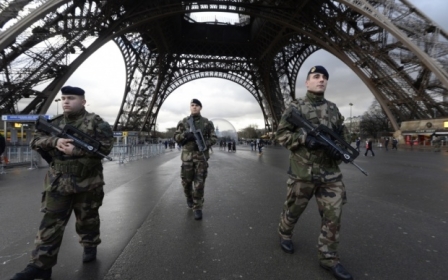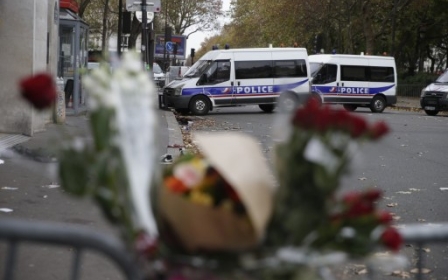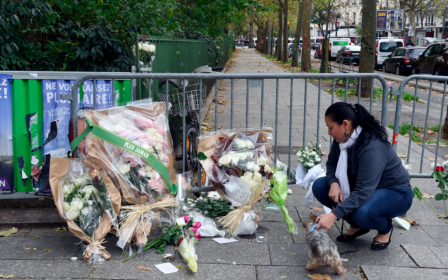Paris attacks: European manhunt continues as France grapples with tragedy

Security operations are continuing across France as well as in Belgium, Greece and Germany as European authorities try to hunt down those responsible for Friday’s bloody attacks in Paris in which 129 people were killed and more than 350 injured. The Islamic State group has taken responsibility for the attack.
Belgian police have made further arrests, with seven people reportedly now in custody in connection with the Paris attacks. This includes one suspect who was allegedly in the French capital at the time of the attacks, and at least three people swooped up in the Brussels district of Molenbeek, which has been linked to several other terror plots in Europe.
Justice Minister Koen Geens said the initial arrests, carried out on Saturday, were in connection with a grey Polo that had been rented in Belgium and was found near the Bataclan concert hall in Paris, scene of one of Friday's attacks. Police in Belgium, which has the highest number of citizens per-capita who have gone to fight for IS in Europe, have opened a formal terrorism investigation.
In France, a car believed to have been used by one of the gunmen who fired at people in restaurants Friday has been found in the north-western Paris suburb of Montreuil. Several AK47 rifles of the sort used during the attacks in Paris were found in the car, a judicial source told AFP on Sunday.
Police have also identified a gunman who blew himself up at the Bataclan concert hall, where 89 people were killed, as 29-year-old Paris native Omar Ismail Mostefai.
Six people close to him, including his father and 34-year-old brother, have been taken into custody by police. A source close to the probe said investigators were searching the homes of friends and relatives of the killer.
Investigators said Mostefai, whose identity was confirmed using a severed fingertip, was known to have links to radical Islam but had never previously been linked to terrorism.
Police said they were investigating whether the attackers, apparently "seasoned, at first sight, and well trained," had ever fought in Syria, where IS has proclaimed a caliphate along with territory in neighbouring Iraq.
The at least seven attackers - six of whom blew themselves up and one who was shot by police - are the first ever to carry out suicide bombings on French soil. Unlike those who killed 17 people in Paris in January, they were unknown to security services. Investigators in France, Belgium, Greece and Germany are now trying to find out who these men were, how they managed to carry out such a vast coordinated attack, and why.
Unlike the attacks in London in 2005, when the bombers' explosives were stored in backpacks, Friday's attackers used the sort of suicide vests normally associated with bombings in the Middle East.
"Suicide vests require a munitions specialist. To make a reliable and effective explosive is not something anyone can do," a former French intelligence chief told AFP, speaking on condition of anonymity.
"A munitions specialist is someone who is used to handling explosives, who knows how to make them, to arrange them in a way that the belt or vest is not so unwieldy that the person can't move. And it must also not blow up by accident."
In Germany, police are interrogating a man who was taken in last week for having explosives and Kalashnikovs in his car. The 51-year-old man from Montenegro told police he was going to Paris "to see the Eiffel Tower" but has refused to discuss the attacks, police said on Sunday.
"We want to talk [about the Paris attacks] with him, but he doesn't want to talk. Not about this subject in any case," a spokesman for police in southern Bavaria said.
The British government meanwhile has deployed special forces to back police on the streets and has also strengthened security at ports and airports.
"There are tried and tested arrangements in place to give military support," Home Secretary Theresa May told the BBC.
Passports and uncertainty
Two Syrian passports were found at the scene, leading to speculation that the attackers arrived in Europe as refugees. One of the attackers had been registered on a Greek island in October, but the latest reports indicate that the passports were faked and likely made in Turkey. Syrian documents have become a hot commodity on the black market, as they should allow holders to easily apply for asylum in places like Germany and Sweeden.
An Egyptian passport found at the scene, and originally linked to a possible bomber, has now been found to belong to a critically injured "football fan", Waleed Abdel-Razzak, the head of the Egyptian community in France, Salah Farhoud, told media on Sunday.
Robin Niblett CMG director of UK-based think tank Chatham House said in a statement: "The attacks come at a very dangerous moment for Europe. Angst, confusion and disagreement over how to handle the unprecedented wave of refugees and migrants are coming to a boil."
"Economic growth remains anaemic in many parts of Europe and unemployment still high. The attacks may strengthen the hand of populist parties which have benefited from these trends just as key elections loom across Europe, starting with regional elections in France in three weeks' time.
"The Paris attacks are now a further challenge to the credibility of EU governments. Whereas the massacre at the offices of Charlie Hebdo in January rallied Europeans around the principle of free speech, people will now wonder whether governments have the capacity to defend them physically, as well as protect their way of life."
France has declared three days of national mourning for the dead, with a special service for the families of the victims and survivors set to take place at Paris's Notre Dame Cathedral later on Sunday.
New MEE newsletter: Jerusalem Dispatch
Sign up to get the latest insights and analysis on Israel-Palestine, alongside Turkey Unpacked and other MEE newsletters
Middle East Eye delivers independent and unrivalled coverage and analysis of the Middle East, North Africa and beyond. To learn more about republishing this content and the associated fees, please fill out this form. More about MEE can be found here.




